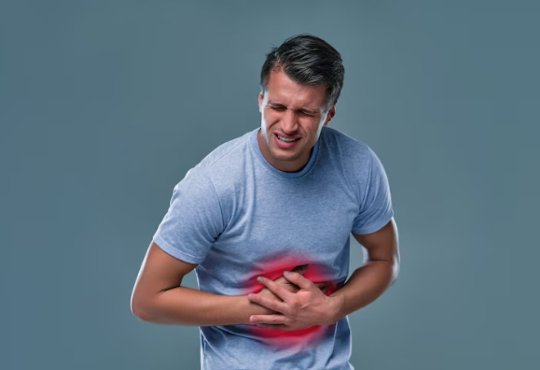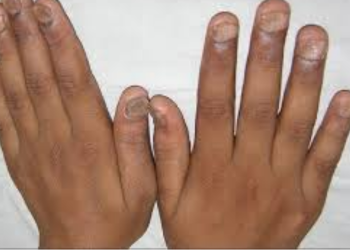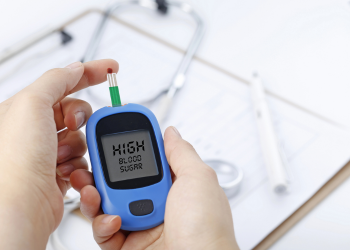Gastroesophageal Reflux Disease (GERD)

GERD occurs when stomach acid repeatedly flows back into the oesophagus.
SYMPTOMS
- A burning sensation in your chest (heartburn), usually after eating,
which might be worse at night or while lying down
- regurgitation of food or sour liquid
- Upper abdominal or chest pain
- dysphagia
- The sensation of a lump in your throat
- An ongoing cough
- Inflammation of the vocal cords (laryngitis)
- New or worsening asthma
CAUSES
- GERD is caused by frequent acid reflux or reflux of nonacidic
content from the stomach.
- When you swallow, the lower oesophageal sphincter relaxes to allow food
and liquid to flow into your stomach. Then the sphincter closes again. If the
sphincter does not relax as it should or it weakens, stomach acid can flow back
into your oesophagus. This acid irritates the lining of your oesophagus, often
causing it to become inflamed.
RISK FACTORS
- Obesity
- Bulging of the top of the stomach up above the diaphragm (hiatal hernia)
- Pregnancy
- Connective tissue disorders, such as scleroderma
- Delayed stomach emptying
- Smoking
- Eating large meals or eating late at night
- Eating certain foods (triggers) such as fatty or fried foods
- Drinking certain beverages, such as alcohol or coffee
- Taking certain medications
Welcome to u460539474_balsam Homeo, your trusted partner in health and well-being. Our team of skilled homeopathic doctors from South India is dedicated to helping you find relief from Gastroesophageal Reflux Disease (GERD). We understand that the discomfort from acid reflux can significantly impact your quality of life. That’s why our clinic in Sharjah focuses on personalized homeopathic remedies that not only alleviate symptoms but also promote overall digestive wellness.
What is GERD?
Gastroesophageal Reflux Disease, or GERD, is a chronic digestive condition characterized by the frequent backflow of stomach acid into the esophagus. This can lead to uncomfortable symptoms such as persistent heartburn, regurgitation of sour liquid, chest pain, and difficulty swallowing. If left unmanaged, GERD can lead to more severe complications, making early intervention crucial.
Our Homeopathic Approach
At u460539474_balsam Homeo, we believe in a holistic approach to treating GERD. Our natural remedies for GERD and acid reflux are crafted to restore balance to your digestive system. We take the time to understand your unique health profile, which allows us to offer treatment options that target the underlying causes of your symptoms, ensuring you achieve long-lasting relief.
Why Choose u460539474_balsam Homeo for Your GERD Care?
- Customized Treatment Plans: No two individuals are alike, and our expert homeopathic doctor in Sharjah will work closely with you to create a treatment plan tailored specifically to your needs.
- Safe and Natural Ingredients: Our homeopathic remedies consist of natural substances that are gentle on your digestive system and free from harmful side effects.
- Comprehensive and Holistic Care: We go beyond treating symptoms; our goal is to understand the root causes of your GERD, providing a comprehensive approach to your health.
Benefits of Homeopathic Remedies for GERD
- Soothing and Gentle: Our remedies are designed to be gentle on your digestive system, making them suitable even for those with sensitive stomachs.
- Promotes Lasting Relief: By addressing the fundamental issues causing GERD, our treatments help you achieve long-term relief and improve your quality of life.
- Enhances Digestive Function: Our holistic methods not only alleviate GERD symptoms but also promote overall digestive health, reducing the likelihood of future flare-ups.
Specialized Care for Acid Reflux
In addition to our GERD treatments, we offer effective homeopathic solutions specifically aimed at acid reflux. These remedies work to calm the esophagus, regulate stomach acids, and provide you with a natural alternative to manage discomfort associated with acid reflux.
Start Your Journey to Better Digestive Health Today
If you’re tired of living with the discomfort of GERD or acid reflux, u460539474_balsam Homeo is here to support you. Our compassionate and experienced homeopathic doctors in Sharjah are committed to guiding you towards improved digestive health through personalized, natural treatment options.
Book Your Consultation Now
Don’t let GERD dictate your life any longer. Visit our homeopathic clinic in Sharjah to explore the benefits of natural and individualized treatment. Schedule a consultation with our expert homeopathic doctor today and take the first step towards reclaiming your health and well-being.





